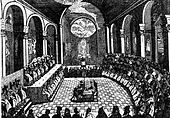
Back المجمعات المسكونية الكاثوليكية Arabic Concilios ecuménicos en la Iglesia católica Spanish Rooma-Katoliku Kiriku oikumeenilised kirikukogud ET Konsili Ekumenikal Katolik ID
| Part of a series on the |
| Ecumenical councils of the Catholic Church |
|---|
 |
| 4th–5th centuries |
| 6th–9th centuries |
| 12th–14th centuries |
| 15th–16th centuries |
| 19th–20th centuries |
|
|
| Part of a series on the |
| Catholic Church |
|---|
 |
| Overview |
|
|

According to the Catholic Church, a Church Council is ecumenical ("world-wide") if it is "a solemn congregation of the Catholic bishops of the world at the invitation of the Pope to decide on matters of the Church with him".[1] The wider term "ecumenical council" relates to Church councils recognised by both Eastern and Western Christianity.
In Catholicism, in addition to ecumenical Councils, there are "particular Councils". Current Canon Law recognizes two kinds of particular Councils: plenary councils involve the bishops of an episcopal conference (usually a single country),[2] while provincial councils involve the bishops of an ecclesiastical province.[3]
The Catholic Church recognizes as ecumenical 21 councils occurring over a period of some 1900 years.[4][5] The ecumenical nature of some Councils was disputed for some time but was eventually accepted, for example the First Lateran Council and the Council of Basel. A 1539 book on ecumenical councils by Cardinal Dominicus Jacobazzi excluded them, as did other scholars.[6]
The first few centuries did not know large-scale councils; they were feasible only after Emperor Constantine granted the Church freedom from persecution. As a result, the Council of Jerusalem or Apostolic Council, held in Jerusalem around AD 50 and described in Acts of the Apostles chapter 15, is not an ecumenical Council, even though most Christian denominations consider that it expresses a key part of Christian doctrine and moral teaching.
- ^ Hubert Jedin, Kleine Konziliengeschichte, Freiburg, Herder, 1960, 14
- ^ 1983 CIC, 1983 Code of Canon Law, https://www.vatican.va/archive/cod-iuris-canonici/cic_index_en.html, 439
- ^ 1983 CIC, 440
- ^ "The 21 Ecumenical Councils". Catholic Answers. Retrieved April 16, 2019.
- ^ "Catholic Library: The 21 Ecumenical Councils". www.newadvent.org. Retrieved April 16, 2019.
- ^ Jedin 11